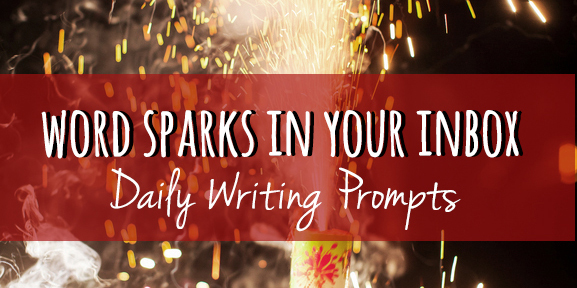Why writing prompts are bringing sexy back
I got married two weeks ago (June 20th) to the love of my life. It’s important for you to know for a few reasons. First, because I’m saving all my lovey-dovey for him (the sass is in high gear) and second, because if you’re looking for me on Facebook my last name has changed. Instead, hit me up here and I’ll find you on the Interwebz. Don’t worry, you can keep calling me Capo. The guy understands I’m keeping my name for writing purposes, because it’s so much cooler.
With Word Sparks being released Tuesday, today is the perfect time to talk about the benefits of writing prompts.
While we’re busy making excuses about why we don’t answer writing prompts, we’re also wasting time we could be using to write our responses. Duh. Stick around if you need a few more reasons why writing prompts are bringing sexy back.
Beat writer’s block
If I had a dollar for every time I heard a writer say, “I always have ideas for the next book,” I’d be starving. And still envious of the five or six people I’ve actually seen write those words in a discussion of why they choose not to use prompts.
I think, though, even the writers who said they’re full of ideas can probably agree they still go through rough patches and still search for inspiration. Otherwise they’re full of shit. Maybe writing prompts aren’t their go-to source for creativity, but they shouldn’t be overruled.
A writing prompt can simply help you get words flowing again. If you’re struggling with a scene or chapter, with a blog post or content ideas, writing prompts will help you get past it. The worst thing a struggling writer can do is force themselves to stop writing until they’ve worked out whatever is challenging them.
Force yourself to step away from chaos and step toward another assignment, one to prove you are capable of writing. A prompt, maybe. Because they aren’t intimidating and you don’t have to show anyone your work. If you use a prompt and it gets words out, it’s done its job.
Hone your craft
Don’t think about using a literary device. Just use one. You might have a favorite, a trick you’re comfortable with throughout your work. But it’s probably getting old for your readers. If you practice using new ones in ‘throw away’ writing, you’re more likely to use a variety of devices. I love alliteration and I probably always will, but I’ve written enough to know I lean on it too much. So I mix it up. Repetition is effective and easy to use. So are anecdotes (like the one I just used).
Using the same devices isn’t a problem, if you’re only thinking of yourself. (Yep, there’s the sass.) When a reader devours your work, they pick up on your formula. If you continue writing in the same ways, you’re either going to become easy-to-imitate or boring. Both are not good.
Practicing using a variety of literary devices will make organically throwing them into your writing a hellavuh lot easier later on. So when it’s time to release new, fresh writing you aren’t sticking to the same tired habits.
Plus, the more you practice, and the more drills you use, the better you’ll become. It’s not likely you’ll see the effects of today’s work tomorrow, but your increase in skill will be much easier to spot if you commit to improving. Practicing different types of writing, no matter how closely related to your work, will help you.
A glass ceiling for creativity? No.
You are not the most creative you’ll ever be. Your brain has the ability to continue growing and expanding, to learn new tricks, much longer than formerly thought. If you think you’re creative enough, (The five of you who said, “Ideas aren’t the problem”) you probably need to use prompts more than those of us who can acknowledge a need for more, fresh ideas.
If you don’t want to grow, to become more creative and less snooze-worthy, I certainly hope you aren’t writing fiction. And while I sound a bit harsh here, it’s hard not to when the value of participating is so evident, yet people still refuse to help themselves. It’s like teaching high schoolers, if you will. And even that comparison isn’t exactly fair, as they LOVE the days I gave them creative writing prompts to complete. And they didn’t come up with nearly the amount of excuses some adults do.
The only downside to writing prompts is they take a little more of your time away. But, you’re in luck, because if you’ve ever made an excuse for why you don’t use them, or thought about using one but didn’t, you can simply replace the time you wasted with actually doing something. Those of you who are already on board are awesome, but you already knew that.
Go here to signup for Word Sparks writing prompts.
***
Got writing questions for Capo? Email capo@rebeccatdickson.com. Confessions of a Dirty Blonde goes out every Thursday.


